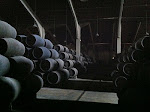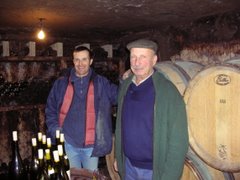A Conversation with Neal Rosenthal - Part 3
This is the final post about my conversation with Neal Rosenthal. It was a great experience for me to spend time with him, and I hope that you've enjoyed reading about it.
We talked a bit more as we finished our lunch.
NR: The best publicity is word of mouth and longevity. I've been doing this for over 30 years and I've hung around by doing a really good job, and by respecting the customer, by the quality of service that I offer. I've been able to make a nice living doing something that I adore, and without compromising my principles.
BG: Aren't there a load of new restaurants opening all the time, places with local and artisinal sensibilities? How do you draw new venues into the fold?
NR: That's why we added Clarke (Boehling), the first new sales rep I've hired in seven years. We realized that we wanted to get everywhere that we should be, and Clarke is helping us do that.
BG: I don't know how anyone can keep up with all of the changes.
NR: You know, I think that young consumers and young people in the wine trade have been cheated out of opportunities to drink old wine. I remember when the great old restaurants in the city like Lutece and La Caravelle would buy their bottles of Bordeaux, and they would put it directly into their cellars. They bought the wine but they had no intention of selling it for years. They wouldn't even put it on the list! That's not happening anymore and it's really a shame. And it's part of why wine is made differently now. Wine is made to drink young now, to gobble down. They relax the tannins, keep the acids low, bring the fruit forward. There's no point in aging those wines, and now it's hard to find old wine that's been stored properly.
BG: Do you keep old bottles of your wines?
NR: Yeah, we can go down and have a look in my cellar in a little while.
BG: (Wiping drool from mouth) That would be awesome. So have you ever had experiences where you like a wine and want to import it, but you think that people won't buy it?
NR: Of course, but I usually buy the wines anyway. You go out and find an audience for the wine. Especially now that my customers are so savvy, so experienced. My Swiss wines, for example. It's hard to sell a $30 bottle of Swiss wine. How many Swiss restaurants are there to sell it to?
BG: Are you successful with those wines?
NR: Not yet, but we will be. It's exciting to work with a group of people growing those grapes and making those unique wines. Eventually people will drink them and find joy in them. And listen, you can have convictions, and still be wrong. I believe in these wines and I enjoy the challenge, so I do it.
BG: I want to ask your opinion on a few hot-button issues, of late. What's your take on the Natural Wine phenomenon?
NR: To become obsessive is bad. What point does it make when you open a Lapierre Morgon without sulfur and the wine is undrinkable? What's the purpose of that? If my sense is that the vineyards are taken care of, if I know the person who grows the grapes and I like them, I'm satisfied. You can go too far with these things...
BG: What about the debate over shipping wines over state lines?
NR: I think it's a phony issue. There is a viability to the three-tier system. Distributors have a role to play because they get out on the street. They're the ones who open the wines for potential customers, they make sure the wines are placed, they take the re-order.
BG: But if I were to move to a state that doesn't allow out of state shipping, I couldn't buy your wines, for example.
NR: Yes, there should be a more open market, but access to wines happens because one person in Memphis demands a wine, other people too, and then a distributor buys the wines.
BG: I guess so. What are the things that you still want to accomplish in your business?
NR: Hmmm. (Thinks for a moment). I'd like to fine tune the portfolio, to ensure that our growers are making wine the way we're used to, that they're not compromising.
And with that, we started walking through the house to the stairs that lead to Neal's underground personal wine cellar.
ND: By the way, what are your hobbies outside of wine?
NR: I'm a long distance runner and I'm quite serious about it. I'm an age-group winner in a half-marathon and I've run several marathons. I've been politically involved, but I'm giving that up in frustration. I still love to write, and farming - I spend a lot of time on that now. And I love to follow my daughter's career, she's the editor of the National Interest journal. Her name is Justine Rosenthal.
BG: How did you get into beekeeping?
NR: Some of the winemakers I work with keep bees and I always found it fascinating. A few years ago I decided to try it myself.
BG: What's your take on the mass bee die-off a few years ago?
NR: There are lots of scientific theories about that, but I think it's pretty simple, actually. Here's what's actually happening with the bees. There are people who keep bees and they travel around the country with the seasons, and sell their services to farms all along the way. We are overworking them, plain and simple. They travel all the time and work all the time, and that's not the way it was meant to be. The more they work, the weaker they become, and the more susceptible to disease.

NR: That's very good wine.
NR: Do you know about Gaudichots? It was part of La Tâche, but then DRC bought most of it up and had it re-classified as Grand Cru. Gaudichots is a great vineyard.
BG: It must be so much fun to have a cellar like this.








10 comments:
Nice interview, Neil!
One thing didn't make sense in this part, "You go out and find an audience for the wine. Especially now that my customers are so savvy, so experienced. My Swiss wines, for example. It's hard to sell a $30 bottle of Swiss wine. How many Swiss restaurants are there to sell it to?"
This is just wrong to me. Why must a Swiss wine be sold in a Swiss restaurant?
Love it! And thanks to Neal Rosenthal for being so friendly and forthcoming.
As if the blog wasn't good enough already, you do an awesome interview like this. Really great. And for me, the perfect follow-up to Rosenthal's book. Thanks so much.
Great series, each post was better than the last. Really enjoyed it. Thanks,
Tom
Thanks for all of these nice comments - I really appreciate it.
Jack - I understand your point, and there is most definitely a chance that my notes do not reflect what Neal actually said. But I take it to mean that He's having a hard time even getting out of the gates with the wines, and Swiss restaurants might be the gates. I am not sure though.
thanks again.
I'd try his Swiss wines. Just have to find some.
Great job with the interview, it sounds like a fun day.
Marc D
Great series. Enjoyed reading it! Wish there was more! Seems like a blessing to be this happy and at peace as he seems to be at 65. And I appreciate his point: "you can have convictions, and still be wrong". Thanks!
Great job with the interview, BG. Really enjoyed following along with all three segments. One question though: who's this ND person that suddenly pops up when you and Neal are headed down to the wine cellar?
Great interview! I have so much respect for what he has been humbly succeeding at for years. Thanks bwg.
I was the first salesperson to the trade that Neal ever hired. Worked for him a couple years in NYC, then went to LA and opened his office there. Lots of ups, lots of downs and lots of growing pains for both of us (for him, growing a company; for me, growing up). To this day, though, I still have never met a better taster of unfinished wine or a more accurate taster in terms of finding wines that would satisfy both commercial and aesthetic parameters. 30+ years in a business that eats its own is certainly testament to something.
Post a Comment